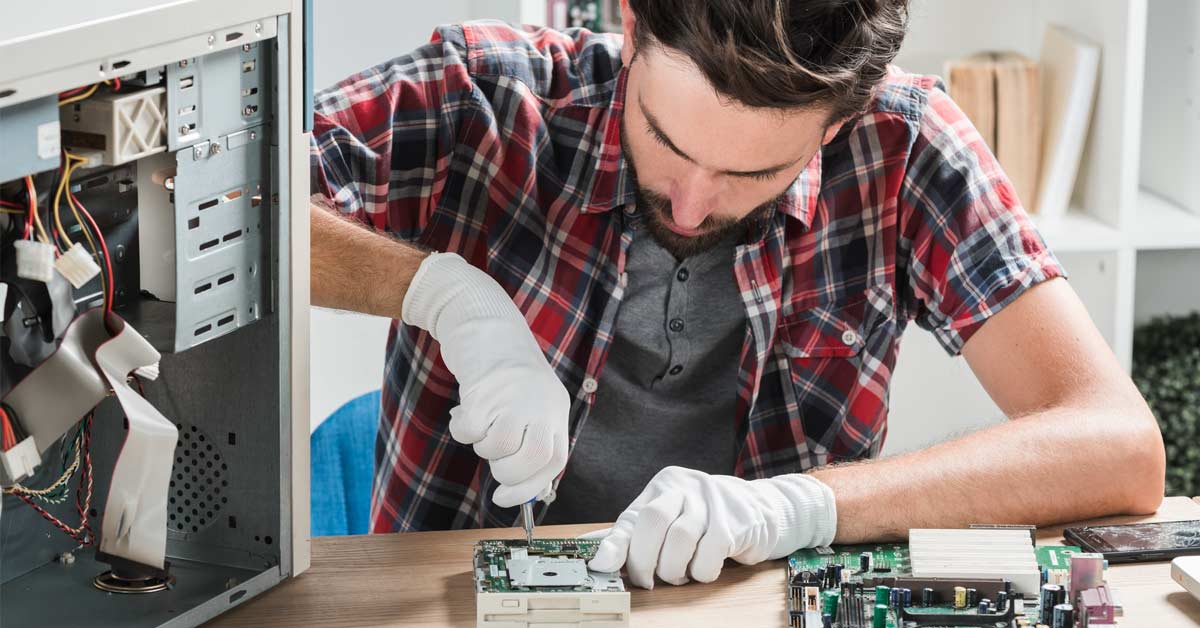Your PC is an essential part of daily life, whether for work, gaming, or staying connected with friends and family. While many common issues can be resolved with basic repairs, some situations require the expertise of a professional. This guide will help you understand which repairs you can tackle on your own and when it’s best to call an expert.
1. Basic PC Repairs
Replacing RAM Modules
Symptoms:
- Frequent system crashes
- Slow performance
- Memory errors
Solution:
- Power down your PC and unplug it.
- Open the case and locate the RAM slots on the motherboard.
- Press the clips on the sides of the RAM slot to release the old RAM module.
- Insert the new RAM module, ensuring it is properly aligned and firmly seated.
- Close the case and power on your PC.
2. Replacing or Adding a Hard Drive/SSD
Symptoms:
- Running out of storage space
- Slow file access times
- Hard drive failure warnings
Solution:
- Power down and unplug your PC.
- Open the case and locate the hard drive bay.
- Disconnect the power and data cables from the old drive.
- Remove the old drive and install the new one, securing it with screws if necessary.
- Reconnect the power and data cables.
- Close the case, power on your PC, and format the new drive if needed.
3. Cleaning Inside the Case
Symptoms:
- Overheating
- Loud fan noise
- Dust buildup
Solution:
- Power down and unplug your PC.
- Open the case and use compressed air to blow out dust from fans, heatsinks, and components.
- Use a soft brush to clean delicate parts.
- Close the case and power on your PC.
4. Replacing the Power Supply Unit (PSU)
Symptoms:
- PC won’t power on
- Random shutdowns
- Electrical burning smell
Solution:
- Power down and unplug your PC.
- Open the case and disconnect all cables connected to the PSU.
- Unscrew and remove the old PSU.
- Install the new PSU, securing it with screws.
- Reconnect all cables to the motherboard, drives, and peripherals.
- Close the case and power on your PC.
5. When to Call an Expert
a. Persistent Blue Screen of Death (BSOD) Errors
Symptoms:
• Frequent BSOD crashes with various error codes
• Unable to boot into Windows
Reason to Call an Expert: BSOD errors can result from hardware failures, driver issues, or software conflicts. An expert can diagnose the exact cause and determine whether hardware replacement or software reinstallation is needed.
b. Complex Hardware Upgrades
Examples:
- Upgrading the CPU
- Replacing the motherboard
- Installing custom cooling solutions
Reason to Call an Expert: These tasks involve complex disassembly and reassembly, BIOS updates, and compatibility checks. An expert ensures that components are correctly installed and configured, avoiding potential damage.
c. Data Recovery
Symptoms:
- Accidental deletion of important files
- Hard drive failure
- Corrupted data
Reason to Call an Expert: Data recovery involves specialized software and sometimes physical repair of the drive. Attempting this without proper tools and expertise can result in permanent data loss.
d. Physical Damage
Examples:
- Cracked screen
- Liquid damage
- Broken ports
Reason to Call an Expert: Undertaking PC repair for physical damage often requires specialized tools and replacement parts. An expert can safely and effectively repair the damage, restoring your PC to working condition.
Conclusion
Basic PC repairs can be straightforward and rewarding, saving you time and money. However, recognizing the limits of your expertise is crucial. For complex issues, persistent problems, or when dealing with valuable data, it’s best to consult a professional. Knowing when to call an expert can prevent further damage and ensure your PC remains reliable and efficient.





